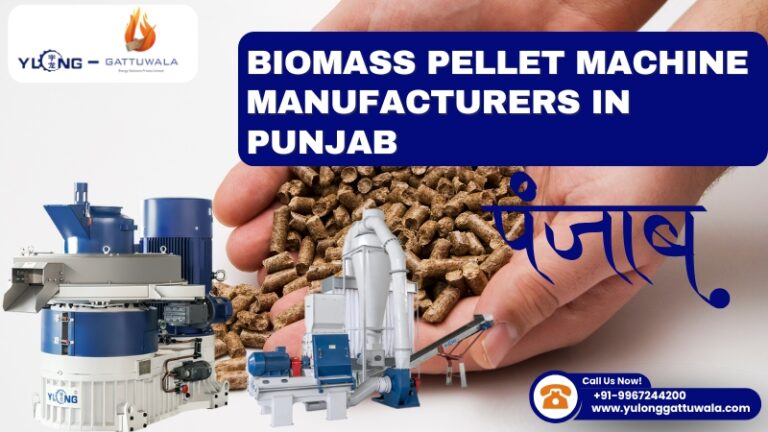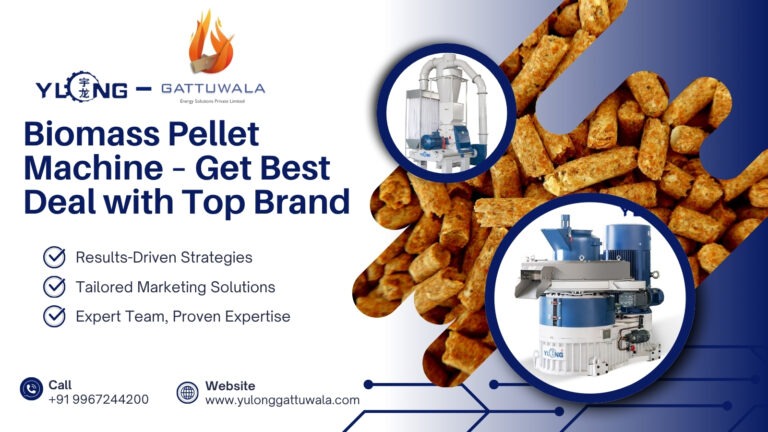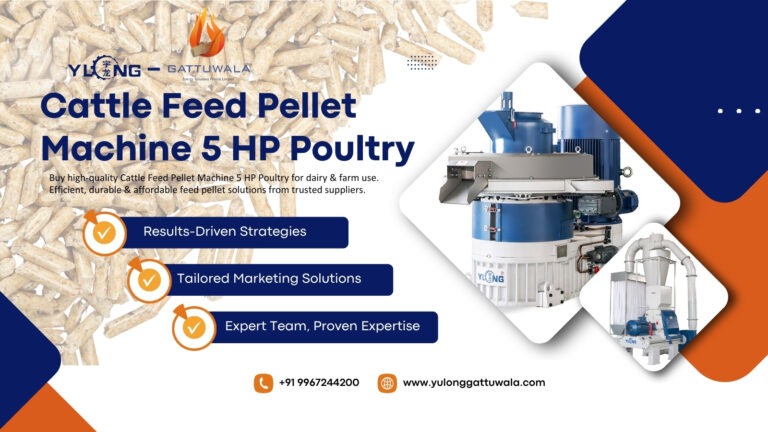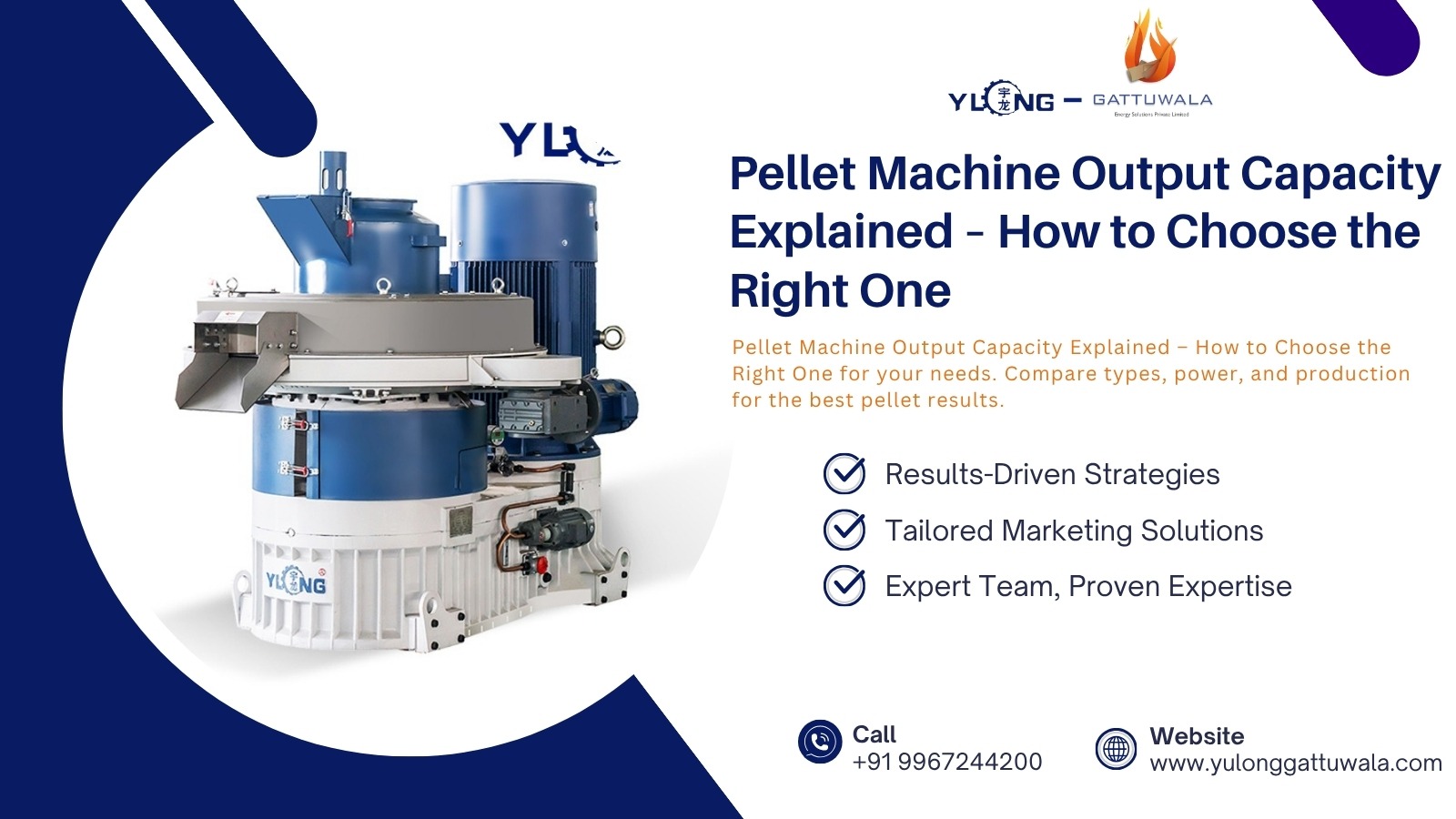- October 11, 2025
Choosing the right pellet machine can make a huge difference in your production efficiency, quality, and return on investment. One of the most important factors to consider before buying a pellet machine is its output capacity. Understanding how output capacity works will help you pick the perfect model for your production goals — whether you’re making biomass fuel, cattle feed, or wood pellets.
In this article, we’ll explain the pellet machine output capacity, the factors affecting it, and how to select the right machine for your business needs.
What Is Pellet Machine Output Capacity?
Pellet machine output capacity refers to the total amount of pellets produced by the machine within a given time, usually measured in kilograms or tons per hour (kg/hr or TPH).
The capacity depends on various elements like raw material type, moisture level, pellet size, machine design, and motor power. For example, a 1-ton/hour biomass pellet machine can handle light materials such as sawdust differently than heavy materials like rice husk or bagasse.
Key Factors Affecting Pellet Machine Output
1. Raw Material Type and Density
Different materials have different densities and compressibility.
• Soft materials like sawdust or pine wood produce higher output due to easy compression.
• Hard or fibrous materials such as rice husk, straw, or sugarcane bagasse reduce capacity because they require more pressure and energy to form pellets.
2. Moisture Content
Moisture is one of the biggest determinants of output.
• The ideal moisture range is 10–15%.
• If the material is too wet, it can clog the die.
• If it’s too dry, pellets may crumble and reduce machine efficiency.
3. Die Type and Hole Size
The pellet die determines both the size and density of pellets.
• Smaller die holes produce smaller pellets but at a slower speed.
• Larger holes increase throughput but may reduce pellet hardness if material prep isn’t optimal.
4. Machine Power and Design
Machines come in different power ranges — from 5 HP for small-scale units to 250 HP industrial models.
• Flat Die Machines: Ideal for 100–800 kg/hr output.
• Ring Die Machines: Designed for 1–10 TPH or more.
High-speed motors and heavy-duty rollers increase productivity while maintaining consistent pellet size.
5. Operator Skill and Maintenance
Even a high-end machine will underperform if not operated properly.
Regular cleaning, proper feeding rate, and timely lubrication of rollers and dies ensure maximum output and long service life.
How to Choose the Right Pellet Machine Capacity
When selecting a pellet machine, consider these factors carefully:
1. Determine Your Production Goals
Start by estimating your daily or monthly pellet requirement.
• Small farms or poultry feed units: 100–500 kg/hr machine.
• Medium enterprises: 1–2 TPH capacity.
• Industrial biomass plants: 3–10 TPH or more.
- Assess Your Raw Material Supply
Your raw material availability must match your desired capacity. A shortage of raw materials can result in underutilization of the machine.
- Evaluate Energy and Space Requirements
Higher capacity machines need stronger power connections and larger operational areas. Ensure your infrastructure supports the chosen capacity.
- Compare Brands and Models
Trusted brands like Gattuwala Energy, in collaboration with Yulong, provide energy-efficient machines with varying capacities, ranging from small-scale models to fully automated industrial pellet plants.
They also offer customized plant setup guidance, helping you select machines that fit your energy input, material type, and financial budget.
Why Choose Gattuwala Energy Pellet Machines
Gattuwala Energy is one of India’s leading suppliers of biomass and feed pellet machines. Their equipment is known for:
• Consistent output performance
• Low energy consumption
• Durable build and long lifespan
• Expert after-sales support
• Customizable production capacities
Whether you need a 500 kg/hr small unit or a 5-ton/hour industrial plant, Gattuwala ensures that your investment delivers maximum efficiency and profitability.
Choosing the right pellet machine output capacity is the key to running a cost-effective and sustainable pellet production business. Evaluate your raw materials, target output, and operational setup before making a purchase.
With advanced models from Gattuwala Energy, you can achieve optimal pellet quality, reliable performance, and superior return on investment. Invest smartly — choose the right capacity and power your production with confidence.
📞 Interested in setting up a biomass pellet plant in India? Contact Gattuwala Energy for expert consultation, equipment, and government subsidy support.

Biomass Pellet Machine Manufacturers in Punjab

Biomass Pellet Machine – Get Best Deal with Top Brand


